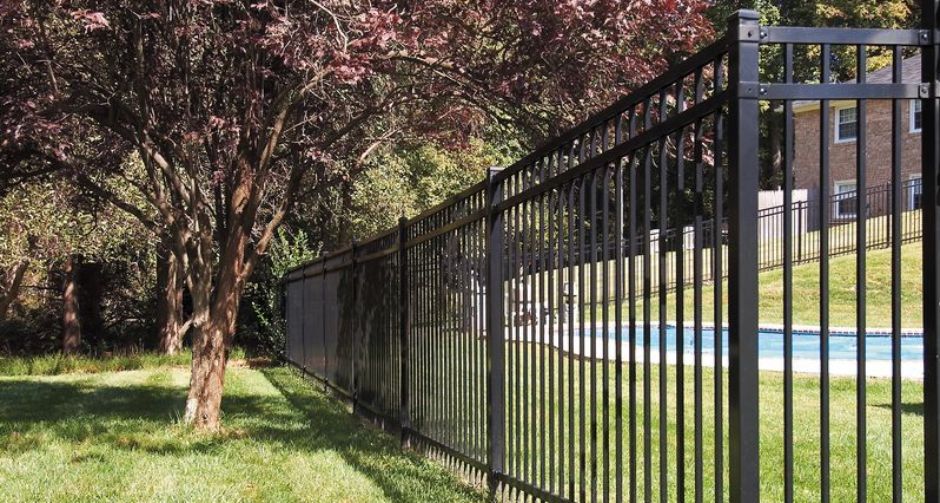Aluminum is a popular choice for fencing due to its durability and resistance to rust. However, it’s important to understand the science behind why aluminum fencing doesn’t rust and how it resists other forms of corrosion.
What is Rust?
Rust is a form of corrosion affecting iron and its alloys, such as steel. It occurs when iron reacts with oxygen and moisture, forming iron oxide, a reddish-brown flaky substance that deteriorates the metal’s integrity over time. This process is accelerated by the presence of salts and other chemicals.
Why Doesn’t Aluminum Rust?
Aluminum, as a non-ferrous metal, does not rust because it lacks iron, which is a key element in forming rust (iron oxide). The rusting process is specific to iron and steel, which contain iron. When these metals come into contact with oxygen and moisture, they undergo a chemical reaction that forms iron oxide, commonly known as rust. Rust is a reddish-brown, flaky substance that deteriorates the metal’s structural integrity over time.
Formation of Aluminum Oxide
When aluminum is exposed to oxygen, it quickly forms a thin layer of aluminum oxide on its surface. This layer is incredibly thin, often only a few nanometers thick, yet it serves a crucial protective function. The aluminum oxide layer adheres strongly to the underlying metal and is impermeable to water and oxygen, effectively halting further oxidation of the aluminum beneath it, according to metallurgist Casper van der Eijk speaking with CORDIS.
Protective Properties of Aluminum Oxide
Unlike rust, which flakes off and exposes more of the iron or steel to the elements, aluminum oxide does not flake away. This stability is because aluminum oxide is much harder and more adherent than iron oxide. Once formed, this oxide layer remains intact and continues to protect the aluminum from further corrosion. This is why aluminum is often chosen for applications where corrosion resistance is crucial.
Environmental Resistance
The protective aluminum oxide layer can withstand a variety of environmental conditions, including exposure to air and water. However, while aluminum itself does not rust, it can corrode under certain conditions. For example, in highly saline environments, such as coastal areas, aluminum can undergo a form of corrosion known as pitting. Pitting occurs when the oxide layer is damaged, allowing chlorides to penetrate and create localized areas of corrosion. Despite this, aluminum’s resistance to general corrosion is still significantly higher than that of iron or steel.
Self-Healing Nature
One of the remarkable properties of aluminum oxide is its self-healing ability. If the oxide layer is scratched or damaged, it will quickly reform in the presence of oxygen. This self-healing characteristic ensures that the protective barrier is continually renewed, providing ongoing protection against corrosion. This makes aluminum an ideal material for long-term applications, particularly in structures exposed to the elements.
In summary, aluminum’s resistance to rust and its ability to form a protective oxide layer make it an excellent choice for fencing and many other applications. Understanding these properties helps in appreciating why aluminum is favored for its durability and low maintenance requirements.
Corrosion in Aluminum
While aluminum is resistant to rust, it is not entirely immune to all forms of corrosion. In environments with high levels of salts or acidic conditions, aluminum can corrode. The most common form of corrosion in aluminum is pitting, where small holes or pits form on the surface due to localized breakdown of the protective oxide layer. To mitigate this, aluminum fences can be coated with protective layers such as paint or powder coatings, which act as additional barriers against corrosive elements.
Protective Measures
To enhance the durability of aluminum fences, especially in harsh environments like coastal areas, it is advisable to use fences that have been painted or powder-coated. All of Long Fence’s aluminum fences are powder coated. These coatings provide an extra layer of protection, ensuring that the aluminum remains resistant to corrosion and maintains its aesthetic appeal for many years.
Conclusion
Aluminum fences are an excellent choice for those seeking a durable, rust-resistant option. Understanding the science behind aluminum’s resistance to rust and its susceptibility to other forms of corrosion can help homeowners and contractors make informed decisions about their fencing materials. With proper protective measures, aluminum fences can offer long-lasting beauty and functionality, even in challenging environments.
For more information on aluminum fences and their maintenance, consider consulting with a Long Fence expert!
Read More:

